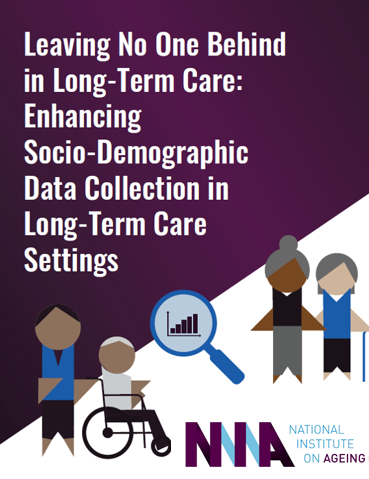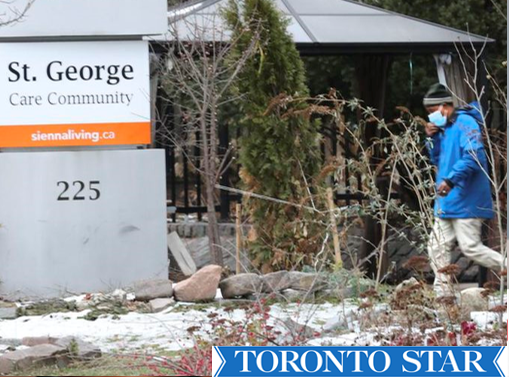July 30, 2021 - CTV News
Major vaccination push in Toronto
"About 90% of Canadians want COVID-19 vaccines. But we have this gap where 10-20% of people haven't gotten vaccinated yet. So we are trying to pivot to a hyper-local strategy, to bring events like these to communities,—to make them fun, easy and very accessible," says Dr. Samir Sinha, Director of Health Policy Research at the National Institute on Ageing.
Read More
July 29, 2021 - CBC News
Families fight against licence renewal for LTC home that saw one of worst COVID-19 outbreaks in Ontario
NIA's Director of Health Policy Research, Dr. Samir Sinha, says COVID-19 has changed the way Canadians think about the long-term care system. "To restore that trust, we're going to have to make sure we're adequately funding that part of our healthcare system, better integrate it, make sure that we're actually supporting staff that are working in these settings and actually have enforceable standards," says Sinha.
Read More
July 29, 2021 - Daily Forum
How has the pandemic impacted Canadians’ perspectives of long-term care homes?
It appears the pandemic has changed the way most Canadians think about their future with long-term care homes. Nima Rajan speaks with Michael Nicin, the Executive Director of the National Institute on Ageing.
"There's been a great awakening due to the pandemic on the circumstances in long-term care. What I think this speaks to is that the pandemic really took a disproportionate toll on long-term care settings. About two thirds of all deaths happened in these settings. This didn't go unnoticed," says Nicin.
Read More
July 29, 2021 - Toronto Star
Will politicians listen and give seniors a real choice?
By: Salvatore Amenta
A recent survey by the Canadian Medical Association (CMA) and National Institute on Ageing (NIA) found that more than 90 per cent of seniors don’t want that. The survey found that seniors want to age in place.
They want to stay home or in affordable housing close to family and friends — in family-sized homes or apartments provided with assisted-living support from publicly-funded, non-profit agencies.
Read More
July 27, 2021 - CBC Radio
A survey from the Angus Reid Institute found that four out of five Canadians say the pandemic altered the way they view LTC homes
"What people don't really understand is that long-term care, which includes the provision of home care and nursing home care, has not ever been part of what's called our Canada Health Act, so we underfund this part of the system significantly. It often operates in the shadow, because it's not fully integrated," says Dr. Samir Sinha, NIA Director of Health Policy Research.
Read More
July 27, 2021 - Global News Radio
New survey found more than 80% of those who responded have changed their views on long-term care
"There's not a lot of options and alternatives outside of a long-term care facility. Around 70% of Canadians are calling for more home care. We need to start supporting Canadians much more in their own homes," says NIA's Executive Director, Michael Nicin.
Read More
July 27, 2021 - Global News Radio
New poll says pandemic has changed how people view LTC in Canada
Guest host Peter Shurman talks to Dr. Samir Sinha, NIA Director of Health Policy Research about how Canadians feel about long-term care, and why we need more nursing homes in the GTA.
Read More
July 27, 2021 - BlogTO
Toronto restaurant praised for asking unvaccinated customers to eat outdoors
A Toronto restaurant asking unvaccinated people to sit outdoors is the latest to take heat for their policy, attracting backlash and the spate of negative reviews that seem to accompany publicly announcing such policies these days.
Medical expert and NIA Associate Fellow, Dr. Nathan Stall, called the honour-based policy a "great move" and like many, argues that this shows how a burden of responsibility has been placed on restaurants that should really belong to the government.
Read More
July 25, 2021 - Zoomer Radio
Improving home care in Canada
"Whatever home care we are providing is largely inadequate and doesn't allow people to stay at home as long as possible. So there's a huge amount of work that needs to be done to not only better fund the system, but organize it so that we are maximizing the value of our home care system," says Dr. Samir Sinha, Director of Health Policy Research at the NIA.
Read More
July 25, 2021 - CBC News
Long waits for Toronto-area nursing homes geared to cultural groups reflect need for more of them, report says
By: Michelle Meiklejohn
A recent study that looked at enhancing data collection in long-term care settings in Canada called for the government to collect a standardized set of sociodemographic information, including age, sex assigned at birth, gender identity, sexual orientation, race, ethnicity, language and Indigenous identity — something that many other countries, including the U.K., Australia and the U.S., already do.
"I think if we were to kind of take up this mandate and advocate for better sociodemographic data collection, we get a better sense of who's accessing and who isn't, and that will give us a sense of where to start directing policy and implementing measures," said Dr. Ashley Flanagan, NIA Research Fellow.
Read More
July 22, 2021 - Remi Network
Scarce data in long-term care homes may hinder reform
Despite the toll COVID-19 has taken on vulnerable populations, a new report from the National Institute on Ageing and Wellesley Institute — Leaving No One Behind in Long-term Care: Enhancing Socio-demographic Data Collection in Long-term Care Settings — shows there is a failure to collect this data, which means that inequitable effects of the pandemic may remain unaccounted for and inadequately addressed.
“This has implications beyond the pandemic as well,” says Dr. Ashley Flanagan, a research fellow at the NIA. “In Canada, health outcomes differ based on factors such as sexual orientation, gender identity, language, race, immigration status, and ethnicity, as well as access to affordable housing, adequate income and social inclusion.
Read More
July 23, 2021 - CETFA
New report shows that reforming long-term care could be hampered by lack of data on vulnerable residents and workers
A new report from the NIA and Wellesley Institute — Leaving No One Behind in Long-term Care: Enhancing Socio-demographic Data Collection in Long-term Care Settings — shows that, due to a lack of data, we still do not have a full picture of the impacts of the pandemic in Canada’s long-term care homes.
While COVID-19 has taken a disproportionate toll on Canada’s most vulnerable populations, a long-standing failure to collect socio-demographic data in LTC settings, means that inequitable effects of the pandemic on residents and workers may remain unaccounted for and, as a result, inadequately addressed.
Without effective solutions, vulnerable populations within long-term care systems could continue to be at risk of inequitable health outcomes and access to care issues.
“This has implications beyond the pandemic as well,” says Dr. Ashley Flanagan, a Research Fellow at the NIA. “In Canada, health outcomes differ based on factors such as sexual orientation, gender identity, language, race, immigration status, and ethnicity, as well as access to affordable housing, adequate income and social inclusion. Policies, programs and resources cannot effectively close gaps in care or improve health outcomes without a better understanding of the diverse needs of residents and workers in long-term care.”
Read More
July 23, 2021 - TVO
The Right Homes for Seniors
This week, TVO re-aired a 2019 program looking at how some seniors see communal living as an answer for housing in their golden years -- and how society often throws up roadblocks to that. Hosted by Steve Paikin, and featuring Dr. Samir Sinha, NIA Director of Policy Research.
Read More
July 22, 2021 - Toronto Star
COVID-19 hit racialized and immigrant groups in long-term care hard. A new report says data is needed for change to happen
Dr. Samir Sinha, Director of Health Policy Research at the National Institute on Ageing, said better care can only be created when you understand and know the people you are serving.
“If it’s a home that’s serving Indigenous people for example, there may be residential school survivors,” he said. “And do the staff have the appropriate training and support to identify issues that exist among residential school survivors?” he said. “It’s understanding that cultural context of the community we might be serving.”
Read More
July 22, 2021 - CBC News
Why mandatory COVID-19 vaccines for health-care workers could help Canada fight a 4th wave
"I absolutely think we should make COVID-19 vaccines mandatory in health care — I think it's a no brainer," said Dr. Nathan Stall, NIA Associate Fellow.
"It's extremely important that we have those who are caring for our most vulnerable with direct, hands-on care be fully vaccinated. There should be no ifs, ands, or buts to that."
Read More
July 21 2021 - Toronto Star
Website that highlighted local businesses vaccine requirements forced to close after online attacks
A database of local businesses in Ontario that had clear vaccine policies and chose to make public the vaccination status of their staffs has been shut down after the businesses were flooded with hateful responses and negative reviews online.
People have shown support for safetodo.ca, including prominent Canadian medical professionals like Dr. Nathan Stall, NIA Research Fellow, and Dr. Andrew Baback Boozary.
Read More
July 20, 2021 - Global News
Ontario LTC home where 81 died turned down advice on COVID-19 isolation rooms: public health emails say
A Toronto long-term care home where 81 residents died of COVID-19 turned down advice from health officials to use “baby monitors” and “room dividers” to help create up to 20 potentially life-saving rooms for sickened residents, according to emails from Toronto Public Health.
“Those are two pretty feasible and practical workarounds to the deficiencies on that fourth floor that [Tendcare is] claiming precluded the use of it,” Dr. Nathan Stall, NIA Associate Fellow, said.
Read More
June 18, 2021 - CBC News
Vaccine hesitancy can make for awkward talks — but honest conversation the best way forward, mediator says
One thing that can help with those decisions is an online risk calculator created by Ryerson University's National Institute on Ageing, said Dr. Samir Sinha, NIA Director of Health Policy Research, one of the medical professionals involved in developing the government-funded tool over the last year.
Read More
July 15, 2021 - CBC Listen
As public health restrictions loosen, people are excited to reunite. How do you navigate the risks of gathering when not everyone is protected?
Dr. Samir Sinha, NIA Director of Health Policy Research, tells host Faith Fundal about a free online tool called My COVID-19 Visit Risk Calculator and how it works.
"As guidelines change, people are now wondering how to safely meet with others. And there's a lot of anxiety. That's why we created this tool." says Sinha.
Read More
July 15, 2021 - Toronto Star
‘Devastating to watch': Private long-term-care homes have seen some of Ontario’s worst death rates – but Doug Ford’s new funding set them up for decades of profits
By: Richard Warnica
Most of the for-profit companies wanted the government to hike redevelopment funding to make it easier, and more lucrative, to rebuild the aging homes that were worst hit by the pandemic. They also wanted the government to allocate new beds, fast, so they could lock in new operating contracts before many of the existing deals expired in 2025.
And what the government did, beginning last summer, before the deadly second wave even began, was say yes, to basically all of it. “They significantly sweetened the pot,” said Dr. Samir Sinha, NIA Director of Policy Research. They offered upfront funding, “which was far more generous than what they’d ever given before,” Sinha said. They also dolled out new beds at an unprecedented rate. “People flooded in all these applications, boom, boom, boom, to get in on this,” Sinha said. The homes “were being given more money and more incentives than ever before to get in this space.”
Read More




















